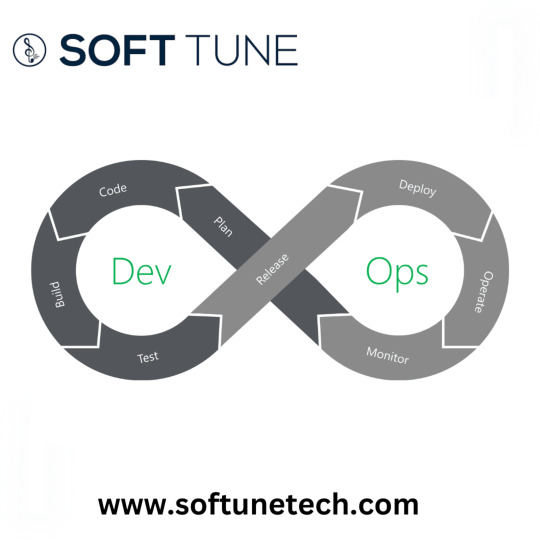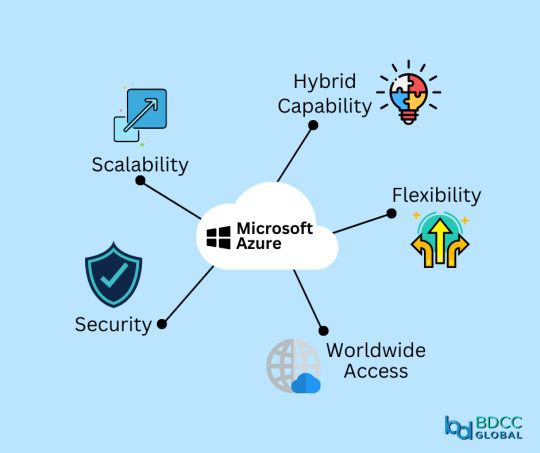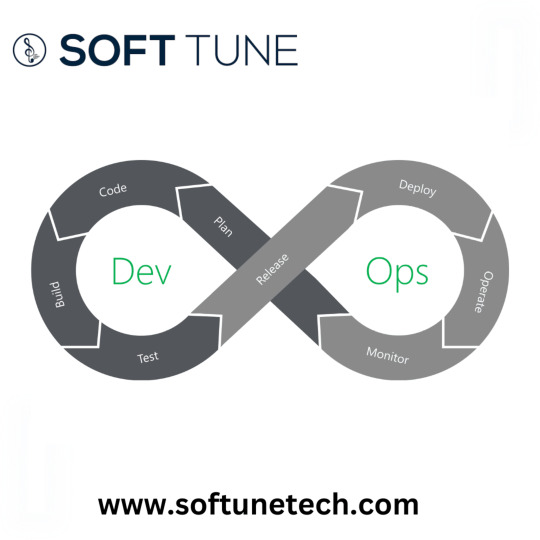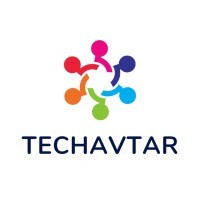#devops services and solution
Text

Softtune technologies identify emerging problems and maintain code in a reusable state at all times, assisting clients in achieving improved performance in development and operations, quicker time to market, and robust software design. Our specialists create a DevOps strategy that enables you to achieve outstanding coordination while offering a positive user experience.
#devops consulting services#devops consulting company#devops services company#devops services#azure devops services#devops managed services#devops services and solution#devops outsourcing#aws devops
0 notes
Text

Looking for a reliable and secure cloud solution for your enterprise? Consider Azure - Microsoft's cloud platform that offers a range of services to help you scale and innovate your business in the cloud.
#cloud solutions#cloud#devops#bdccglobal#cloud computing#azure service company#azure#services#business#innovation
2 notes
·
View notes
Text
Best Software Development Company in India and India
Best Software Development Company in India and India
Microlent System is the website development company in india.There are Many Services :
Our Futuristic Technology Solutions Providers in India :
Web Application Development & Designing Company in India | Microlent
Best website Projects development Company in india and usBest software development services in india
Best website and android development
custom business software development
Get Business Solutions Services in India | IT companies in Jodhpur
Software Development & Web Development Company in USA and india
Mobile & Tablet Application Development Company in usa and india
best tv application app development company in usa | Microlent India
Best Android Apple watch app development in usa and india | Microlent
ERP Solutions development in India and USA
Best Machine Learning Solutions Company | IT companies in Jodhpur
IoT hardware integrated soution | IT Company in India
Best devops and automation services in india | microlent
Complete Data Analytics Solutions & Services for Data-Driven Businesses | Microlent
Professional Project Management Service Provider | MicrolentBest
IT staff Augmentation services in usa and india
Best QA and testing Services in usa and india
UI-UX Design Solution Company in India and USA | Microlent
Business technology solutions in India | Microlent Systems
RPA Services in India and USA | Microlent System
Read More :
#web developing company#web developers#web development#software development#usa software#software development usa#it services#custom software development#mobile app developers#erp solutions#rpa services#ui ux development services#qa testing#quality assurance#business analytics#devops development services#devops#project management template free#machine learning#web app development
6 notes
·
View notes
Text
2 notes
·
View notes
Text
Top 5 Salesforce DevOps Best Practices for Successful Deployment
Introduction:
As organizations continue to evolve, the need for faster and more reliable deployments has become critical. In the world of Salesforce, where customization and development are at the heart of business operations, ensuring that updates and changes are efficiently managed is key to staying competitive. This is where Salesforce DevOps comes into play, providing a framework for better collaboration, automation, and continuous delivery.
By following best practices in Salesforce DevOps, companies can avoid common pitfalls and achieve smoother, more successful deployments. In this article, we will explore the top 5 Salesforce DevOps best practices that will help you optimize your deployment processes and ensure your Salesforce services run smoothly.
1. Continuous Integration and Continuous Deployment (CI/CD)
What is CI/CD?
CI/CD is at the core of any DevOps solution and involves automating the process of integrating code changes (Continuous Integration) and deploying those changes to production (Continuous Deployment). For Salesforce environments, this practice allows developers to merge code frequently, reducing the chances of conflicts and bugs down the line.
Why it Matters in Salesforce DevOps:
In the Salesforce ecosystem, frequent code changes and updates can create challenges if not managed properly. CI/CD pipelines help ensure that every change is automatically tested and deployed, eliminating the manual processes that often delay releases. By setting up automated pipelines, you reduce the risk of errors and ensure that updates are delivered faster and more reliably.
Best Practice Tip:
Use tools like Salesforce DX, Git, and Jenkins to set up an efficient CI/CD pipeline. Automate the testing and deployment process to minimize manual intervention and human error.
2. Version Control for Effective Change Management
What is Version Control?
Version control allows developers to track changes to code, collaborate effectively, and maintain a history of modifications. For Salesforce DevOps, using a version control system (VCS) like Git is crucial for managing multiple teams working on the same Salesforce services simultaneously.
Why it Matters in Salesforce DevOps:
Salesforce environments are often shared by multiple developers, admins, and teams, each contributing to different aspects of the platform. Without proper version control, changes can easily conflict with one another, leading to bugs or even system downtime. By implementing version control, you ensure that every change is tracked, making it easier to roll back if something goes wrong.
Best Practice Tip:
Adopt a Git-based version control system and ensure all developers use it consistently. This will help track changes, avoid code conflicts, and maintain a clear history of updates.
3. Automated Testing for Quality Assurance
What is Automated Testing?
Automated testing involves using scripts and testing frameworks to automatically validate that code behaves as expected. This is a crucial part of any DevOps solution and becomes even more important in a Salesforce environment where frequent updates and changes are common.
Why it Matters in Salesforce DevOps:
Manual testing is time-consuming and error-prone. In Salesforce DevOps, automated testing ensures that every change made to your Salesforce services is tested immediately, reducing the chances of introducing bugs into the production environment. Automated tests help validate that new features work as intended and that existing functionality is not broken by the updates.
Best Practice Tip:
Incorporate automated testing into your CI/CD pipeline. Use testing tools like Provar or Selenium to create comprehensive test suites that run automatically during every build and deployment process.
4. Monitoring and Feedback for Continuous Improvement
What is Monitoring and Feedback?
Monitoring and feedback involve tracking the performance of your deployments and gathering input from users and systems to identify areas for improvement. In Salesforce DevOps, monitoring tools help you understand how deployments affect the performance and stability of your Salesforce services.
Why it Matters in Salesforce DevOps:
Continuous monitoring ensures that any issues in your Salesforce environment are detected early, enabling faster resolution. Feedback loops between development, operations, and users allow teams to quickly address any shortcomings in their deployment processes or application performance. This leads to better outcomes and more reliable services.
Best Practice Tip:
Use monitoring tools such as New Relic or Datadog to track the performance of your Salesforce environments. Set up alerts and dashboards to visualize key metrics and gather user feedback to continuously improve your DevOps process.
5. Governance and Security: Ensuring Compliance
What is Governance and Security?
Governance refers to policies and procedures that ensure your Salesforce environment adheres to internal and external compliance standards. Security ensures that your Salesforce services are protected from vulnerabilities, especially when deploying changes through a DevOps solution.
Why it Matters in Salesforce DevOps:
For industries like finance and healthcare, compliance with regulations (such as HIPAA or GDPR) is critical. Any changes made to your Salesforce environment must be compliant with these regulations to avoid penalties. Integrating governance and security checks into your DevOps pipeline ensures that every change is reviewed for compliance and security risks before being deployed.
Best Practice Tip:
Implement governance and security checks into your DevOps pipeline by using tools like Copado or Gearset, which offer built-in compliance and security checks for Salesforce environments. Additionally, ensure that your development and operations teams are trained on security best practices.
Conclusion
Adopting Salesforce DevOps best practices is essential for ensuring successful deployments, faster time-to-market, and better collaboration across teams. From implementing CI/CD pipelines to incorporating automated testing, monitoring, and governance, these practices will help you optimize your Salesforce environment for speed, reliability, and security.
By following these top 5 Salesforce DevOps best practices, your organization can achieve smoother, more reliable deployments while enhancing the quality and performance of your Salesforce services.
0 notes
Text
#Cloud Services#Cloud Consulting Services & Solutions#Cloud Consulting Services#Cloud Consulting Services in India#Cloud Strategy & Consulting Service#Cloud Managed Services#aws cloud consulting services#devops consulting and managed cloud services#cloud software consulting services#amazon cloud consulting services#Cloud Consulting Services India#microsoft azure cloud consulting services#best service cloud consulting providers#aws cloud services#website designing company in delhi ncr#Web Designing Company in Noida#Web Designing Company in India#Best Website Design Company in Noida#Website Designing & Web Development Company in Noida#Website Designing in Noida#Web Designing Company#Website Designing Company#Best web design company#Website Development Company in Noida#custom software development companies#custom software development company in noida#custom software development company in India#custom software development#custom software development services#software company in India
0 notes
Text

Mindfire Solutions offers expert DevOps services, helping businesses streamline their software development and operational processes. Their services focus on continuous integration, automation, and collaboration, enhancing efficiency and reducing deployment time. With experienced professionals, Mindfire Solutions delivers tailored DevOps services to meet specific client needs, ensuring seamless development cycles and operational scalability. They support businesses in achieving faster delivery, higher quality, and improved system reliability through effective DevOps strategies.
0 notes
Text

Optimize your workflow with leading DevOps services! 🚀 Our solutions provide seamless continuous integration and automated deployments to boost your productivity. 💼🔧 Learn how we can help streamline your operations.
#Hire DevOps Developers#Hire DevOps Engineer#Hire Dedicated DevOps Developers#Hire DevOps Specialist#DevOps Services and Solutions#DevOps Consulting Company#Best DevOps Consulting Company#DevOps Services#DevOps Consulting Services#DevOps Professional Services#DevOps Automation Services#DevOps Automation Services and Solutions#AWS Certified Devops Engineer#Devops Companies#AWS Devops Engineer
0 notes
Text
Sify’s Microservices in DevOps: Accelerating Innovation Through Scalable and Agile Architectures
In the fast-evolving world of software development, businesses are constantly seeking ways to accelerate time-to-market, enhance agility, and ensure continuous delivery of high-quality applications. The convergence of DevOps practices and microservices architecture has emerged as a powerful solution to these challenges. Sify Technologies, a leader in digital transformation, offers cutting-edge microservices in DevOps solutions, empowering businesses to build, deploy, and manage applications with unprecedented speed, flexibility, and resilience.
The Power of Microservices in the DevOps Era
Traditional monolithic application architectures, where all components are tightly interwoven, have long been the standard in software development. However, as applications grow in complexity, these monolithic structures become difficult to scale, update, and maintain. Enter microservices — a revolutionary approach to application design that breaks down monolithic applications into smaller, independent services that can be developed, deployed, and scaled independently.
When combined with DevOps — a set of practices that emphasize collaboration between development and operations teams, automation, and continuous delivery — microservices enable businesses to achieve a level of agility and scalability that was previously unattainable. This synergy allows for faster development cycles, more reliable deployments, and the ability to quickly respond to changing market demands.
Sify’s Microservices in DevOps: Driving Digital Transformation
Sify’s Microservices in DevOps solutions are designed to help businesses embrace this modern approach to software development and delivery. By leveraging the principles of microservices and DevOps, Sify enables organizations to create more modular, scalable, and resilient applications that can adapt to the dynamic needs of the digital age.
1. Architecting for Agility and Scalability
Sify’s expertise in microservices architecture allows businesses to break down complex applications into a collection of loosely coupled services. Each service is responsible for a specific function and can be developed, tested, deployed, and scaled independently. This modular approach not only simplifies the development process but also enhances the agility of the entire application lifecycle.
By adopting a microservices architecture, businesses can scale individual components based on demand, optimize resource utilization, and reduce the risk of system-wide failures. Sify’s solutions ensure that these microservices are designed for high availability and performance, providing a robust foundation for mission-critical applications.
2. Accelerating Development with Continuous Integration and Continuous Delivery (CI/CD)
One of the core principles of DevOps is the automation of the software development lifecycle through Continuous Integration (CI) and Continuous Delivery (CD) pipelines. Sify’s Microservices in DevOps solutions integrate seamlessly with CI/CD pipelines, enabling businesses to automate the build, test, and deployment processes for each microservice.
This automation not only speeds up the development process but also ensures that code changes are continuously tested and deployed, reducing the risk of errors and enabling faster delivery of new features and updates. With Sify’s expertise, businesses can achieve shorter release cycles, higher code quality, and a more responsive development process.
3. Enhanced Collaboration and DevOps Culture
The success of a microservices architecture depends not only on the technology but also on the culture and processes that support it. Sify’s DevOps solutions foster a culture of collaboration and shared responsibility between development, operations, and quality assurance teams. By breaking down silos and promoting cross-functional teamwork, Sify helps businesses create a unified environment where everyone is aligned towards the common goal of delivering high-quality software quickly and efficiently.
Sify also provides the tools and practices needed to support this collaborative culture, including version control, automated testing, continuous monitoring, and feedback loops. These practices ensure that all stakeholders have visibility into the development process and can contribute to the success of the project.
4. Security and Compliance in a Microservices World
As applications become more distributed and modular, ensuring security and compliance across all microservices becomes a critical challenge. Sify’s Microservices in DevOps solutions include robust security measures that are integrated into every stage of the development and deployment process.
From secure coding practices and automated security testing to encryption, identity management, and compliance monitoring, Sify ensures that security is a built-in feature of every microservice. This approach helps businesses mitigate risks, protect sensitive data, and ensure compliance with industry regulations, all while maintaining the agility and speed that microservices and DevOps provide.
5. Monitoring, Management, and Optimization
Managing a microservices-based application requires continuous monitoring and optimization to ensure that each service performs optimally and that the overall system remains healthy. Sify’s Microservices in DevOps solutions include comprehensive monitoring and management tools that provide real-time insights into the performance of individual services and the application as a whole.
These tools allow businesses to detect and resolve issues quickly, optimize resource allocation, and ensure that the application meets performance and availability targets. By leveraging advanced analytics and automated alerts, Sify helps businesses maintain a high level of operational excellence and deliver a superior user experience.
Industry Applications: Transforming Business with Microservices and DevOps
Sify’s Microservices in DevOps solutions are transforming the way businesses in various industries develop and deliver software. In the financial services sector, for example, Sify’s solutions enable faster development of banking and payment applications, allowing businesses to respond quickly to regulatory changes and customer demands. In the retail industry, microservices and DevOps enable the rapid deployment of e-commerce platforms, personalized shopping experiences, and real-time inventory management systems.
In healthcare, Sify’s solutions support the development of telemedicine platforms, electronic health records (EHR) systems, and patient engagement applications, all while ensuring compliance with strict security and privacy regulations. Across these and other industries, Sify’s Microservices in DevOps solutions are driving digital transformation, enabling businesses to innovate, scale, and compete more effectively.
The Sify Advantage: Expertise, Innovation, and Customer Focus
Choosing Sify for Microservices in DevOps means partnering with a company that is deeply committed to customer success. Sify brings a wealth of expertise in both microservices architecture and DevOps practices, along with a strong focus on delivering solutions that are tailored to each client’s unique needs.
With a proven track record of success across a wide range of industries, Sify is the partner of choice for businesses looking to embrace the future of software development. Sify’s approach is built on a foundation of innovation, excellence, and a deep understanding of the challenges and opportunities that businesses face in the digital age.
As the demand for faster, more agile, and scalable software continues to grow, microservices and DevOps have become essential components of modern application development. Sify Technologies, with its comprehensive Microservices in DevOps solutions, is at the forefront of this transformation, helping businesses build, deploy, and manage applications that meet the demands of today’s fast-paced market.
By partnering with Sify, businesses can leverage the power of microservices and DevOps to accelerate innovation, enhance agility, and deliver high-quality software that drives business success. Whether it’s through architecting scalable microservices, automating CI/CD pipelines, fostering a DevOps culture, or ensuring security and compliance, Sify provides the expertise and solutions needed to thrive in the digital era.
0 notes
Text
Transforming Software Development: The Power of DevOps Services
In the fast-paced world of software development, businesses are constantly seeking ways to enhance efficiency, speed up delivery, and maintain high-quality standards. DevOps, a blend of Development and Operations, has emerged as a game-changing approach that breaks down the traditional silos between development and operations teams, fostering a culture of continuous integration, continuous delivery (CI/CD), and collaboration. In this blog, we’ll explore the importance of DevOps services and how partnering with a trusted DevOps solution provider like MicroGenesis can transform your software development process.
What Are DevOps Services?
DevOps services encompass a range of practices, tools, and cultural philosophies designed to increase an organization’s ability to deliver applications and services at high velocity. This means evolving and improving products faster than organizations using traditional software development and infrastructure management processes. Key components of DevOps services include:
Continuous Integration (CI): Automatically integrating code changes from multiple contributors into a shared repository several times a day.
Continuous Delivery (CD): Ensuring that code changes are automatically prepared for a release to production.
Infrastructure as Code (IaC): Managing and provisioning computing infrastructure through machine-readable configuration files.
Automated Testing: Using automated tests to ensure that the software is always in a releasable state.
Monitoring and Logging: Continuously monitoring the application and infrastructure performance and logs to identify issues in real-time.
Benefits of DevOps Services
Faster Time-to-Market: By streamlining and automating processes, DevOps enables faster delivery of new features and updates.
Improved Collaboration: Breaking down silos fosters a culture of collaboration and shared responsibility among teams.
Enhanced Quality and Reliability: Automated testing and continuous monitoring ensure that code is always in a deployable state.
Scalability and Flexibility: Infrastructure as Code allows for easy scaling and consistent environments across development, testing, and production.
Reduced Costs: Automation and efficient workflows reduce manual efforts and operational costs.
Choosing the Right DevOps Solution Provider
Partnering with a reliable DevOps solution provider is crucial for a successful DevOps transformation. Here’s why MicroGenesis stands out as a leading DevOps consulting company:
Expertise and Experience
With years of experience in the industry, MicroGenesis offers unparalleled expertise in DevOps solutions and services. Our team of certified professionals understands the intricacies of DevOps practices and tools, ensuring a seamless transition and implementation for your organization.
Comprehensive DevOps Solutions
MicroGenesis provides end-to-end DevOps consulting services, from initial assessment and strategy development to implementation and ongoing support. Our solutions include:
DevOps Assessment and Strategy: Evaluating your current processes and creating a tailored DevOps strategy.
CI/CD Pipeline Setup: Designing and implementing continuous integration and delivery pipelines.
Infrastructure Automation: Automating infrastructure provisioning and management using tools like Terraform, Ansible, and Puppet.
Monitoring and Logging: Implementing robust monitoring and logging solutions to ensure high availability and performance.
Security and Compliance: Integrating security practices into your DevOps workflow (DevSecOps) to ensure compliance and data protection.
Tailored Solutions for Every Business
MicroGenesis understands that every business is unique. Our DevOps consulting firm works closely with you to understand your specific needs and challenges, providing customized solutions that align with your goals and objectives. Whether you’re a startup or a large enterprise, our flexible and scalable DevOps services cater to businesses of all sizes.
Proven Track Record
Our success stories speak for themselves. MicroGenesis has helped numerous organizations achieve significant improvements in their software development processes, resulting in faster delivery times, higher quality products, and satisfied customers.
Conclusion
Embracing DevOps is no longer an option but a necessity for businesses looking to stay competitive in today’s dynamic market. By leveraging the expertise of a trusted DevOps service provider like MicroGenesis, you can unlock the full potential of your software development lifecycle. From strategy development to implementation and continuous support, we offer comprehensive DevOps solutions and services that drive efficiency, collaboration, and innovation.
Ready to transform your software development process? Contact MicroGenesis today to learn how our DevOps consulting services can help you achieve your business goals.

#devops services#devops solution providers#devops consulting company#devops consulting firm#devops solutions and services#devops service provider
0 notes
Text

Softtune technologies identify emerging problems and maintain code in a reusable state at all times, assisting clients in achieving improved performance in development and operations, quicker time to market, and robust software design. Our specialists create a DevOps strategy that enables you to achieve outstanding coordination while offering a positive user experience.
#devops consulting services#devops consulting company#devops services company#devops services#azure devops services#devops managed services#devops services and solution#devops outsourcing#aws devops
0 notes
Text

Personalization Is Still A Challenge For CX Leaders In 2024
The challenge of personalization resonates across various industries. Iqbal Javaid, Head of CX Solution Engineering at Zoom, articulates this challenge succinctly:
“My biggest challenge is ensuring our solution remains not just relevant, but indispensable to our customers. With the landscape of customer expectations evolving rapidly, staying ahead means constantly innovating to meet their needs while maintaining seamless integration with their existing systems. It’s about striking that delicate balance between anticipating future demands and delivering value that drives business growth and customer retention.”
This sentiment reflects the ongoing struggle many companies face in keeping pace with rapidly changing customer expectations while also maintaining operational efficiency.
Leverage technology to address personalization challenges and achieve CX excellence
In this demanding landscape, many organizations are turning to technologies like CCaaS. These platforms can help address personalization challenges by providing integrated tools for data analysis, customer interaction management, and personalized communication across multiple channels.
The features enabled by CCaaS such as customer data centralization, automated personalization, consistent omnichannel communications, scalability, and advanced analytics make it an effective vehicle in the pursuit of CX personalization.
As businesses continue to navigate the complexities of personalization in 2024, considering CCaaS migration could be a strategic move. These technologies offer the tools and capabilities needed to meet rising customer expectations for personalized experiences while managing resource constraints.
#CCaaS platforms#CX solutions#CX Automation#CX migration#CCaaS environments#DevOps Automation#devops automation services
0 notes
Text

#Top Technology Services Company in India#Generative AI Development Company#AI Calling Software#AI Software Development Company#Best Chatbot Service Company#AI Calling Software Development#AI Automation Software#Best AI Chat Bot Development Company#AI Software Dev Company#Top Web Development Company in India#Top Software Services Company in India#Best Product Design Company in World#Best Cloud and Devops Company#Best Analytic Solutions Company#Best Blockchain Development Company in India#Best Tech Blogs in 2024#Creating an AI-Based Product#Custom Software Development for Healthcare#NexaCalling Best AI Calling Bot#Best ERP Management System#WhatsApp Bulk Sender#Neighborhue Frontend Vercel
0 notes
Text








The Summer 2024 release brings major enhancements for Lightning Web Components (LWC), making creating powerful, interactive apps easier than ever. From URL-addressable LWCs to third-party web component integrations, developers have a lot to look forward to. Dive into the details and transform your Salesforce experience today!
Ready to upgrade your Salesforce setup? Explore our Salesforce services and contact us now for a consultation:
#Salesforce #LWC #Summer2024 #SalesforceSummer2024Highlights #TechUpdates #WebComponents #DeveloperTools #SalesforceIntegration #LightningWebComponents #ApexDevelopment
#software devops service#digital customer experience services#digital strategy consultant#devops service#commerce tools#digital transformation consultant#it service provider#it consulting services#software#softwaredevelopment#software company#IT Solutions#web development#digital marketing#digital commerce#Digital Transformation#digital experience#ALTDigital#Alt Digital#salesforce#salesforce cloud#Salesforce Development#Salesforce development services#Salesforce developers#salesforce partner#salesforce services#Salesforce Development Company
0 notes
Text

#aws cloud services#best service cloud consulting providers#microsoft azure cloud consulting services#Cloud Consulting Services India#amazon cloud consulting services#cloud software consulting services#devops consulting and managed cloud services#aws cloud consulting services#Cloud Managed Services#Cloud Strategy & Consulting Service#Cloud Services#Cloud Consulting Services in India#Cloud Consulting Services#Cloud Consulting Services & Solutions#ios app development company in noida#custom software development company in noida#software development company in noida#app development in noida#Cloud Consulting Services in Noida#software development company in india#custom software development companies#custom software development#custom software development company in India
0 notes
Text
Mindfire Solutions excels in delivering top-notch DevOps services designed to enhance software development and deployment processes. Their expert team integrates automation, continuous integration, and continuous delivery to streamline operations and boost efficiency. With a focus on reducing time-to-market and improving product quality, Mindfire Solutions leverages modern DevOps practices to address complex challenges in IT environments. Their tailored approach ensures clients achieve scalable, reliable, and high-performance solutions, ultimately driving business growth and innovation. For businesses seeking effective DevOps services, Mindfire Solutions provides a comprehensive and strategic partnership.

0 notes